Vendetta in New York: Terranova Uncovers History and the Old World
Dennis Loiacono, co-writer of the upcoming play Terranova, was doing family history when he stumbled upon archival articles about Josefina Terranova, a young 16-year-old Sicilian girl who was put on trial in 1906 New York for murdering her abusive aunt and uncle. He was drawn into the tumultuous true story of an impoverished immigrant girl who signifies so much about what life was like for Italians in the United States in the early twentieth century, when they poured into New York harbor by the masses. Many of them transported ancient customs that
conflicted with the American way of life they encountered. The play Terrvanova presents a girl who is both typical and extraordinary, submissive yet ultimately aggressive in her call for justice.
Young Josefina is given to her relatives to be brought up, since her mother is too poor to care for her, and her father is deceased. She finds a world of violence and incest in the home of her aunt and uncle, who force her to work in a brothel and have no qualms exploiting her in appalling ways. Josefina's world seems to brighten up when her aunt and uncle arranged her marriage, one tradition of her Old World Sicilian culture. The solace Josefina finds her in marriage is short lived, and the archaic notion of the vendetta from her Sicilian roots is carried out in a brutal yet arguably justifiable act.
Dennis's experience growing up with a grandfather who was an immigrant from Sicily partially inspired him to co-write Terranova with his cousin Pamela Monk. They intend to show Terranova's audience what countless people endured in order to assimilate into American environments. Discrimination and poverty commonly confronted immigrants, and the strongest conquered these facets of life. Watching his older family members retain some Italian cultural aspects and acquire American lifestyles taught Dennis about the rocky road to assimilation that many stumbled upon to achieve success and eventually feel a sense of belonging.
Josefina is a villain for some and a heroine for others. Yet her strength and will to live are undeniable, and the documented attention to her trial from Italian immigrants across the American landscape suggests that her fate represented a greater fate for young women of her time.
The themes of Terranova are manifold and heart wrenching. One feels sympathy for the abused Josefina who has limited to no say in how the course of her life unfolds—until the day she commits murder. In the eyes of Americans, she is a killer who must be severely punished with her life. Yet the act of violence that ensues in Terranova may be condonable from the viewpoint of Old World tradition. In the Sicilian culture in which Josefina was born and raised, one's reputation is immeasurably important: when a woman's reputation is spoiled, she is worth nothing. For Josefina, her admittance into a new family meant safety and her only prospect for a new life. Her aunt and uncle robbed her of many things, but Josefina would not allow her reputation to die without revenge. This is the Old v. New World conflict that Terranova poses to viewers. How can we justify the murder of two people by placing the fault on the Sicilian vendetta, and when that tradition of retaliation sparks murder in America, what is to be done?
In 1906 women had few basic rights, and for Josefina to be on trial probably meant imminent death. A hotshot New York lawyer takes her defense, and through his efforts, the real story is set loose in a dramatic sequence of courtroom testimony. People faint as the horror and shame are released in words as Josefina explains how and why she takes her vendetta. Another aspect of the Old World portrayed in Terranova is religion and its role in the lives of Italian immigrants. Josefina's claim that she heard the voice of God telling her to murder her relatives may not validate her deed to Americans; but in Sicily, is this a credible excuse?
A notable theme that writers Dennis Loiacono and his cousin Pamela Monk explore in Terranova is how immigrants and following generations change. It is natural to give up aspects of a culture and replace them with new ones adopted from one's immediate surroundings. Perhaps it is even advantageous to abandon to the wayside those archaic traditions of the Old World: the obsession with honor, pride and fulfilling the vendetta that would restore reputation through the enemy's downfall. Through their work Dennis Loiacono and Pamela Monk hope the audience will acknowledge that "we must remember where we cam from" and bear witness to the struggle of one girl who battles so much to survive.
Terranova will be playing at The Lafayette Street Theatre, 45 Bleecker Street (at Lafayette), Sunday August 16th through Thursday August 27th.
Written by Pamela Monk and Dennis Loiacono
Directed by Theresa Gambacorta






























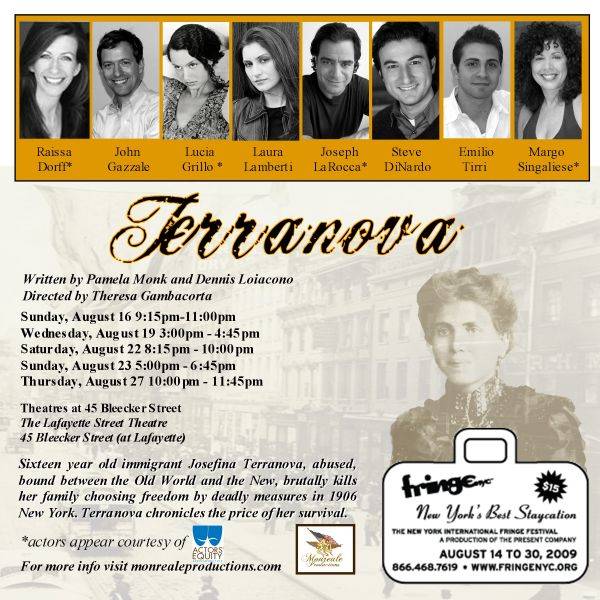
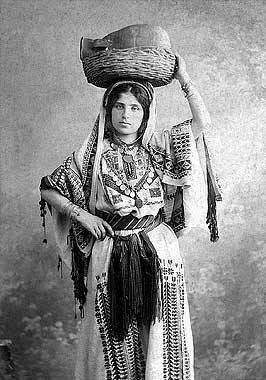
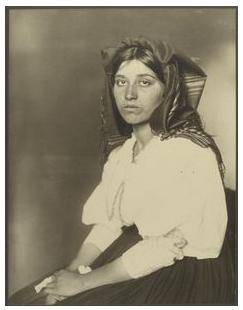
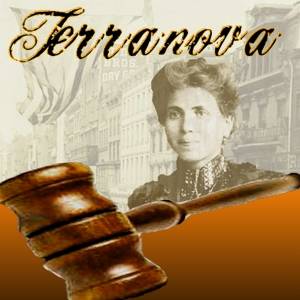




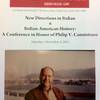


i-Italy
Facebook
Google+
This work may not be reproduced, in whole or in part, without prior written permission.
Questo lavoro non può essere riprodotto, in tutto o in parte, senza permesso scritto.